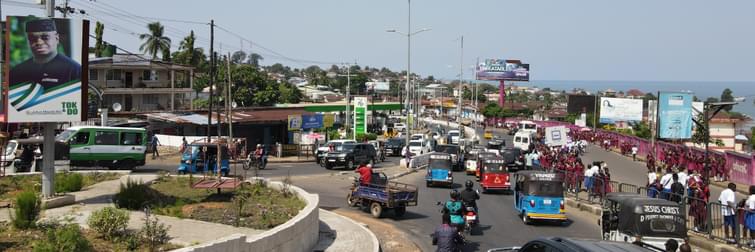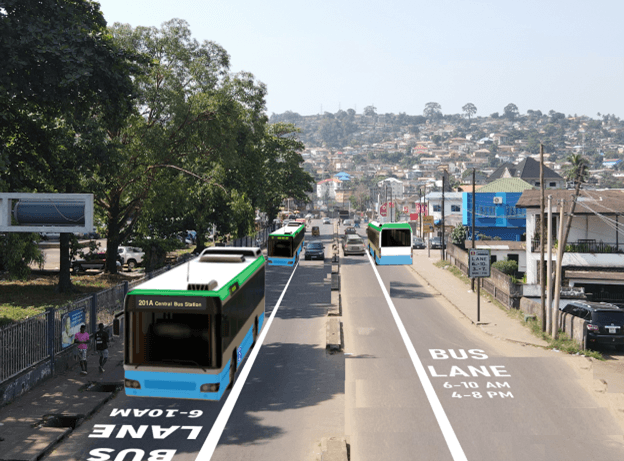
blog: A New Era for Public Transport in Freetown, Sierra Leone
Tuesday 19th September 2023
Since 2019, ITP has been supporting the Ministry of Transport and Aviation of Sierra Leone in the implementation of the Sierra Leone Integrated and Resilient Urban Mobility project (SLIRUMP). This ambitious and transformational project is seeking to reform the urban public transport industry through the implementation of formalised and regulated bus corridors. To modernise and professionalise the transport sector, a multi-dimensional approach has been undertaken to deliver a holistic improvement to the public transport industry. This aims to improve service quality standards of public transport through higher quality and capacity vehicles, a new formalised business, contracting, ticketing and operating model, the introduction of a public transport regulatory body and the implementation of supporting infrastructure and traffic management measures such as bus priority and parking management.
Freetown is typical of many West African cities with a highly informal system of public transport that consists of Poda Poda’s (minibuses), shared taxis (saloon cars), Okada (bike taxis) and Keke (three-wheeler taxis). Although the city has a public transport mode of 70%, which many European cities would envy, the quality of the fleet means that the system is inefficient, dangerous, and highly polluting. This was reflected by a 2018 survey carried out by ITP with over 1,500 public transport users in Freetown, with safety being the most popular consideration when making a public transport trip followed by capacity (having a seat).
The third most popular consideration was reliability. Poor reliability is partly down to the poor standard of fleets and informal operating practices, but also down to the traffic conditions. High levels of roadside activity including roadside parking, street traders, loading and unloading of trucks and the construction of structures on footpaths means the network is very congested. Speeds recorded by ITP’s TransitWand GPS surveys found that at traffic hotspots such as Lumley and within the CBD are less than 5kph.
Breaking the cycle
Over the past three decades public transport in Freetown has degraded and would continue to worsen if a business-as-usual approach was adopted. The poor traffic conditions, lack of maintenance and informal operating practices mean public transport operators struggle to fund, invest and improve their services.
The SLIRUMP aims to break the cycle through the creation of an enabling averment for higher quality formalised bus operations achieved through traffic management, a strong regulatory and ticketing system and the seed investment through a fleet of 50 high quality buses.
The Pilot Corridors
The SLIRUMP has focused interventions along two pilot corridors in the capital city of Freetown. An eastern corridor between Jui and the CBD and a western corridor between Number 2 River and the CBD.
To begin with, Phase 1 operations will see 50 new buses deployed on routes between Lumley and the CBD on the western corridor and between Calaba Town and the CBD on the eastern corridor. These routes are forecast to carry up to 50,000 passengers a day combined when operations start late in 2023.
These are pilot routes and are seen as just the start of the formalisation process in Sierra Leone. Additional routes and corridors are being planned for and will be delivered once further buses are procured. With analysis and service planning undertaken by ITP estimating up to 500 buses are needed to serve 22 routes in Freetown over the next 10 years.
Bus Priority
The SLIRUMP corridors are not intended to be full Bus Rapid Transit (BRT) corridors. Although they may be upgraded to BRT in the future, to begin with they will simply be quality bus corridors (QBCs) with targeted bus priority measures.

Formalised bus stops and restrictions on private vehicle parking and stopping will be introduced. On the arterial sections of the corridors the kerb side lane will be reallocated to serve as a bus only lane at peak hour periods of the day. In Freetown’s historic city centre where streets are not dual carriageway there is insufficient space for bus lanes and private vehicle lanes as such the buses will be given priority through a mix of bus only streets, counterflow bus lanes and one way bus lanes.
The New Buses
Through The World Bank grant the Government of Sierra Leone has procured an initial 50 high-capacity Ashok Leyland 12-meter buses to ply the two pilot routes. These vehicles will represent step change in the quality and capacity of the existing fleets. The vehicles will be leased to private operators as part of the gross cost contracting.
Operators and Regulator
A fundamental shift that has been achieved through the SLIRUMP is the way public transport in Sierra Leone is planned, regulated and operated. The new system will be a regulated and formalised public transport model with a transport authority planning routes, timetables and levels of services and contracting the operations of the route out to a private operator through a Gross Cost contract. This model is like the model used by many cities such as by TfL in London wherein the transport authority pays the operators a fixed per km fee for meeting a stipulated set of vehicle km’s based on a timetable.
To achieve this model the SLIRUMP has needed to undertake two important actions that ITP has supported the government in, firstly, the creation of transport authority to take on the planning and regulatory role. Secondly to establish formal operating companies capable of delivering the service levels set out in the Gross Cost contracts.
Establishing a Transport Authority
To achieve this, the Government of Sierra Leone opted to transition the Sierra Leone Road Transport Cooperation (SLRTC) the existing state public transport operator into a public transport authority. ITP has supported the Government in the change management process, and this culminated in April 2023, when the Government of Sierra Leone established the Sierra Leone Public Transport Authority (SLPTA) through the passing the SLPTA Bill in Parliament and presidential signing.
Establishing Formal Operators
The project has worked with the incumbent informal operators to establish formal companies who will operate the routes. ITP supported the Government through an extensive engagement process over two years with existing operators and unions. This process has already led to the creation of a formal operating company in Freetown.
If you would like to know more about how ITP can help support your vision for integrated and resilient urban mobility and decarbonisation strategies then please get in touch.
